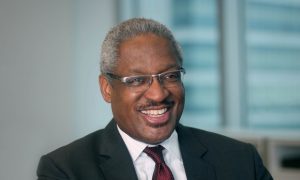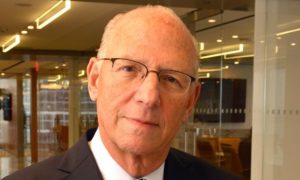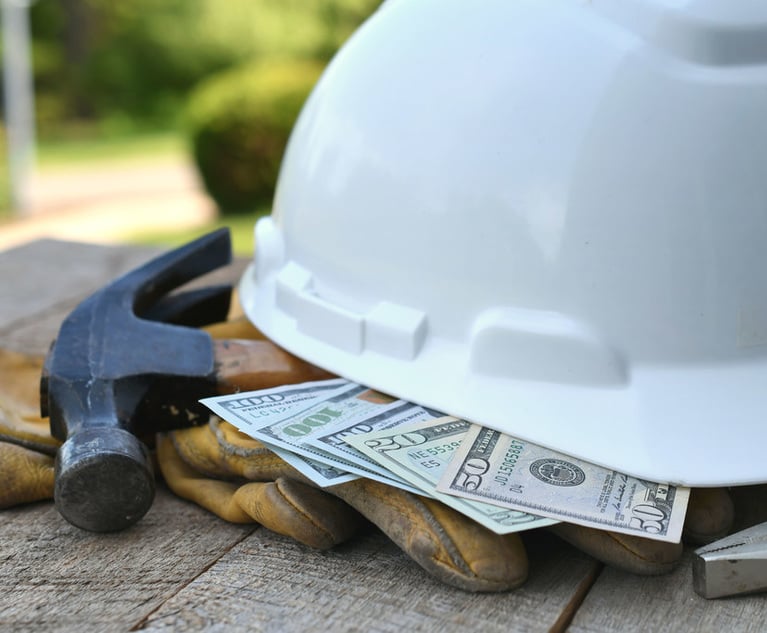Recession, Technological Change Top of Mind in Law Firm Leader Outlook
Despite the shadow of a recession, many law firm leaders aren't fazed. Technology, on the other hand, is challenging firms every day.
November 12, 2019 at 06:00 AM
8 minute read
 Image by Shutterstock.com
Image by Shutterstock.com
While a potential recession may be worrying some, business is still good in the Sunshine State, say the heads of Florida's largest law firms.
The presidents, CEOs and managing partners of Florida's most established and sprawling law firms offered their insights to the Daily Business Review on what is top of mind as 2019 winds down and 2020 approaches.
Technology-driven disruption, an uptick in international work and the meteoric rise of Florida's marijuana industry are all top-line trends. Unsurprisingly, and given the warning signs, the shadow of an economic downturn also hangs over the coming year.
Many firms are beginning to bulk up their countercyclical bankruptcy practices. An estimated 533 restructuring attorneys have moved laterally this year, according to ALM data. Last year only 413 bankruptcy attorneys made a lateral move. Gibson, Dunn & Crutcher; Jones Day; Morgan, Lewis & Bockius; and Mayer Brown have all reinforced their bankruptcy practices in the past few months in anticipation.
 Scott Meyers
Scott MeyersBut few, if any, of the major firms headquartered in Florida share the pessimism and are following suit. Clients are still optimistic, they say.
"Our clients are remaining very bullish," said Scott Meyers, who was tapped in August to be Akerman's next chairman and CEO.
"We keep recession on our mind and inquire about it to our practice and industry groups," said Holland & Knight managing partner Steve Sonberg. "People are generally bullish."
Al Dotson, managing partner of Bilzin Sumberg, is positive as well, rattling off several projects that are planned or underway: The Metrorail expansion into Broward ("We're just getting started," he said), a $5 billion renovation of Miami International Airport, and continued development of the 160-acre luxury automotive club Drivers Club Miami.
"I'm very bullish on real estate," Dotson said.
 Al Dotson
Al DotsonMany of these big projects are evidence of an increased appetite for public-private partnerships that will continue to fuel growth, Dotson said. He brought up the $2 trillion transportation bill that Congress and the Trump administration tentatively agreed to in April as an indication of the federal government's determination to invest in infrastructure. And he added that so-called opportunity zones will continue to attract investors.
Created by the 2017 tax law, opportunity zones offer up a reduction or deferment of capital gains taxes for developers who build in low-income areas designated by the state. Florida hosts 427 opportunity zones, with 68 of the designated areas located in Miami-Dade, according to the Miami-Dade Beacon Council.
As of May, at least five opportunity zones were put up for sale on the South Florida market.
"My optimism stems from an increase in demand, the fact that government is getting more creative in funding, and a sense that government will continue to support expansion," Dotson said.
Technological Change
Nearly all leaders agreed that technology would continue to be a driving force for change in the coming year.
 Steven Sonberg
Steven Sonberg"In the business of law we're looking at ways to enhance our service to clients and how tech can be a game changer for certain work we do," Holland & Knight's Sonberg said. "We're in a constant state of change right now."
Holland & Knight has developed products and systems for clients in conjunction with partner Josias Dewey, who moonlights as a software developer. Right now, the firm is using artificial intelligence to handle large projects for clients, shorten document review in litigation and speed up due diligence for corporate deals.
The technological imperative reaches across firms regardless of size. Partners Steven Marks and Peter Prieto of litigation boutique Podhurst Orseck have been steadily contracting out electronic discovery work to e-discovery firms such as International Litigation Services.
The need has emerged with the ubiquitous use of electronic communications. Email and text messages are dumped by the terabyte in the particularly large class-action cases Podhurst handles, such as the firm's Boeing 737 Max litigation.
"Everything is written down now," Marks said. "We have that situation with Boeing right now. They're producing massive amounts of data."
Hemispheric Gateway
 Dean Cannon
Dean CannonFlorida's pitch to law firms and lawyers has been its status as a focal point for international investment, a "hemispheric gateway" as GrayRobinson President and CEO Dean Cannon puts it.
In 2019, law firm leaders are seeing even more international investment, and expect the work to only increase in the coming year.
After years of contraction in Miami, Baker McKenzie is remaking its Miami office into the "hub" for its new Latin America initiative. Nelson Mullins Broad & Cassel bolstered its Latin America corporate practice by three, with lead lateral Jackson Hwu saying that he gets calls for projects every day now.
Japanese investor SoftBank has been on a billion-dollar tear in Latin America, so much so, in fact, that Morrison & Foerster poached a nine-attorney Greenberg Traurig corporate team in Miami to service its client.
GrayRobinson's Cannon, who took over from his predecessor Mayanne Downs in September, has made boosting the firm's international capabilities an early priority in his leadership term, absorbing intellectual property firm Espinosa Martinez in October as a first step.
"One thing I'm focused on is the impact of international business," Cannon said. "There's lots of capital flowing in and out of our state."
 Leslie Smith
Leslie SmithLeslie Smith, managing partner of Foley & Lardner's Miami office, sees much of this activity driven by Miami's growing prominence as an arbitration hub for Latin America, as well as the slackening of regulations in Brazil under President Jair Bolsonaro.
"From an international perspective, specifically in Miami, we're monitoring what's going on in Brazil," Smith said.
In October, Foley & Lardner added a veteran foreign legal consultant, Pedro Romano Fragoso Pires, to meet the growing demand for Latin America expertise. Pires served the same role in his former firm, DLA Piper, and has spent his 25-year career advising Brazilian and U.S. companies on cross-border deals.
Marijuana Madness
Smith also noted that the fledgling marijuana industry in Florida is a potential bright spot for Florida and Foley & Lardner's cannabis industry team.
"It's an exploding industry," she said.
After about a year of relative quiet as the state ironed out operational issues surrounding legal marijuana, the industry has taken off. Florida's medical marijuana industry was valued at an estimated $626 million last year, and a report estimated revenues could increase to $1.1 billion by 2022.
Lucrative and scarce marijuana licenses go for as much as $95 million and the demand from some 280,000 qualified patients is leading to a shortage.
 Marbet Lewis
Marbet LewisMost of the legal work in Florida's medical marijuana space stems from lobbying, government relations, and litigation, said Spiritus Law partner and alcohol attorney Marbet Lewis.
Since medical marijuana's legalization by constitutional amendment in 2016, regulations and statutes have been in flux as the state struggles with the implementation of the ballot language.
Smokable medical marijuana only became available in March after the Florida Legislature repealed a ban on flower products, and the Florida Supreme Court may take up a question over the requirement that licensed operators be vertically integrated, meaning that operators must grow, process and distribute the cannabis. Critics argue that this sort of system limits investment in the industry.
Regardless of the challenges, Lewis sees the marijuana boom as a question of when, not if. Two separate ballot initiatives that could come up for a vote in 2020 seek to make recreational marijuana legal. Should that happen, business will explode, she added.
Established companies will look to acquire Florida growing operations and distributors, giving rise to opportunities for transactional attorneys. Medical professionals such as doctors and dentists who are already experimenting with nonpsychoactive CBD will seek counsel to help bring marijuana products to market. And alcohol companies have already expressed interest in integrating with the cannabis market.
"In Florida, we're at the base right now," Lewis said. "And there's nowhere to go but up."
Similar Stories:
Opportunity Zones Seen as Bonus Rather Than Driving Force on Deals
This content has been archived. It is available through our partners, LexisNexis® and Bloomberg Law.
To view this content, please continue to their sites.
Not a Lexis Subscriber?
Subscribe Now
Not a Bloomberg Law Subscriber?
Subscribe Now
NOT FOR REPRINT
© 2025 ALM Global, LLC, All Rights Reserved. Request academic re-use from www.copyright.com. All other uses, submit a request to [email protected]. For more information visit Asset & Logo Licensing.
You Might Like
View All
SEC Whistleblower Program: What to Expect Under the Trump Administration
6 minute read
Turning the Shock of a January Marital Split Into Effective Strategies for Your Well-Being
5 minute read
Latest Boutique Combination in Florida Continues Am Law 200 Merger Activity
3 minute read
South Florida Real Estate Lawyers See More Deals Flow, But Concerns Linger
6 minute readTrending Stories
- 128 Firms Supporting Retired Barnes & Thornburg Litigator in Georgia Supreme Court Malpractice Case
- 2Boosting Litigation and Employee Benefits Practices, Two Am Law 100 Firms Grow in Pittsburgh
- 3EMT Qualifies as 'Health Care Provider' Under Whistleblower Act, State Appellate Court Rules
- 4Bar Report - Feb. 3
- 5Was $1.3M in 'Incentive' Payments Commission? NJ Justices Weigh Arguments
Who Got The Work
J. Brugh Lower of Gibbons has entered an appearance for industrial equipment supplier Devco Corporation in a pending trademark infringement lawsuit. The suit, accusing the defendant of selling knock-off Graco products, was filed Dec. 18 in New Jersey District Court by Rivkin Radler on behalf of Graco Inc. and Graco Minnesota. The case, assigned to U.S. District Judge Zahid N. Quraishi, is 3:24-cv-11294, Graco Inc. et al v. Devco Corporation.
Who Got The Work
Rebecca Maller-Stein and Kent A. Yalowitz of Arnold & Porter Kaye Scholer have entered their appearances for Hanaco Venture Capital and its executives, Lior Prosor and David Frankel, in a pending securities lawsuit. The action, filed on Dec. 24 in New York Southern District Court by Zell, Aron & Co. on behalf of Goldeneye Advisors, accuses the defendants of negligently and fraudulently managing the plaintiff's $1 million investment. The case, assigned to U.S. District Judge Vernon S. Broderick, is 1:24-cv-09918, Goldeneye Advisors, LLC v. Hanaco Venture Capital, Ltd. et al.
Who Got The Work
Attorneys from A&O Shearman has stepped in as defense counsel for Toronto-Dominion Bank and other defendants in a pending securities class action. The suit, filed Dec. 11 in New York Southern District Court by Bleichmar Fonti & Auld, accuses the defendants of concealing the bank's 'pervasive' deficiencies in regards to its compliance with the Bank Secrecy Act and the quality of its anti-money laundering controls. The case, assigned to U.S. District Judge Arun Subramanian, is 1:24-cv-09445, Gonzalez v. The Toronto-Dominion Bank et al.
Who Got The Work
Crown Castle International, a Pennsylvania company providing shared communications infrastructure, has turned to Luke D. Wolf of Gordon Rees Scully Mansukhani to fend off a pending breach-of-contract lawsuit. The court action, filed Nov. 25 in Michigan Eastern District Court by Hooper Hathaway PC on behalf of The Town Residences LLC, accuses Crown Castle of failing to transfer approximately $30,000 in utility payments from T-Mobile in breach of a roof-top lease and assignment agreement. The case, assigned to U.S. District Judge Susan K. Declercq, is 2:24-cv-13131, The Town Residences LLC v. T-Mobile US, Inc. et al.
Who Got The Work
Wilfred P. Coronato and Daniel M. Schwartz of McCarter & English have stepped in as defense counsel to Electrolux Home Products Inc. in a pending product liability lawsuit. The court action, filed Nov. 26 in New York Eastern District Court by Poulos Lopiccolo PC and Nagel Rice LLP on behalf of David Stern, alleges that the defendant's refrigerators’ drawers and shelving repeatedly break and fall apart within months after purchase. The case, assigned to U.S. District Judge Joan M. Azrack, is 2:24-cv-08204, Stern v. Electrolux Home Products, Inc.
Featured Firms
Law Offices of Gary Martin Hays & Associates, P.C.
(470) 294-1674
Law Offices of Mark E. Salomone
(857) 444-6468
Smith & Hassler
(713) 739-1250






